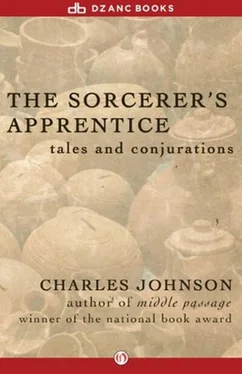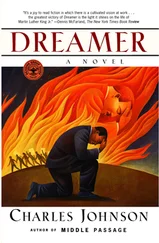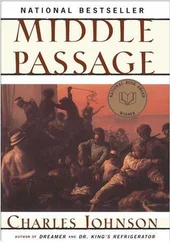Charles Johnson - Sorcerer's Apprentice
Здесь есть возможность читать онлайн «Charles Johnson - Sorcerer's Apprentice» весь текст электронной книги совершенно бесплатно (целиком полную версию без сокращений). В некоторых случаях можно слушать аудио, скачать через торрент в формате fb2 и присутствует краткое содержание. Год выпуска: 2014, Издательство: Dzanc Books, Жанр: Современная проза, на английском языке. Описание произведения, (предисловие) а так же отзывы посетителей доступны на портале библиотеки ЛибКат.
- Название:Sorcerer's Apprentice
- Автор:
- Издательство:Dzanc Books
- Жанр:
- Год:2014
- ISBN:нет данных
- Рейтинг книги:3 / 5. Голосов: 1
-
Избранное:Добавить в избранное
- Отзывы:
-
Ваша оценка:
- 60
- 1
- 2
- 3
- 4
- 5
Sorcerer's Apprentice: краткое содержание, описание и аннотация
Предлагаем к чтению аннотацию, описание, краткое содержание или предисловие (зависит от того, что написал сам автор книги «Sorcerer's Apprentice»). Если вы не нашли необходимую информацию о книге — напишите в комментариях, мы постараемся отыскать её.
Sorcerer's Apprentice — читать онлайн бесплатно полную книгу (весь текст) целиком
Ниже представлен текст книги, разбитый по страницам. Система сохранения места последней прочитанной страницы, позволяет с удобством читать онлайн бесплатно книгу «Sorcerer's Apprentice», без необходимости каждый раз заново искать на чём Вы остановились. Поставьте закладку, и сможете в любой момент перейти на страницу, на которой закончили чтение.
Интервал:
Закладка:
I missed whatever he said next, for now I heard the suction of sweating bodies, whiffed the venereal, fishlike bouquet of love. My old woman sighed, “Oh, Doctor…” I leaned forward, sweating from the soles of my feet upward, fingers in my beard; then, in disbelief, I saw Gary Freeman, his back glistening with perspiration, pull on a pair of Danger High Voltage slacks, and dry Mildred with one of my best Hawaiian shirts. Chuckling, he held it up to his face. “Does Henry really wear this shit?” My stomach tightened. My throat squeezed as if in a fist. On Mildred’s walnut bureau, a crumpled Trojan lay atop a copy of The Joy of Classical Piano . I closed my eyes, counted twenty, turned my face from the screen, then opened my lids quickly. They fell to it again. They shook my picture off the wall.
“You’re the only medicine I need,” groaned Mildred.
I had cardiac arrest for the rest of my life. Too weak to stand, I sat heavily on the platform, opened my bag, took out the sphygmometer, and checked my blood pressure: 140 over 110.
The Creature gently placed a tentacle on my shoulder. “Come away, Henry.” He adjusted the Telecipher—“It seems we are both strangers here, no?”—which responded by flashing from my bedroom to images of his Lifeworld — a low-gravity planet in the Alpha Centauri-A galaxy, a star system much like our own — but I was too shaken to pay attention. I pulled loose my collar. How in heaven’s name could she do this to me? Trembling, I gave myself a shot of Dilantin and closed my eyes. They were right, Gary and Mildred; I was wrong. You couldn’t really fault Mildred or the boy if, as the new morality said, a man like me, an antique Negro with my close-cropped haircut, heavy glasses that diffused my pupils, Murray’s hair pomade, and funny Old Testament ways, was a relic — the product of ideas obsolete before I was born. By the way the world reckoned things, I was, at fifty-eight, Victorian, out of fuel now and running on the fumes. Old and crapped out. A pain corkscrewed through my chest. Should I weep? Should I call my attorney? Should I return to the only thing in this world that gave my life ballast: my work? I wheeled away, still flushed with confusion, from the Telecipher with this in mind, only to discover that the Creature had in my moment of confusion gone critical and was now so sensitive and overwrought that the slightest contact with objects in the saucer made him wince. “I want to say God bless you, Henry, and thank you for trying.” He smiled sickly at me. He was no taller than my knee. His mouth slipped sideways, then he fell, his figure forming an X that seemed to obliterate everything. “The idea has just occurred to me that all phenomena are products of my ego.”
Poor creature, he was past helping.
“You have to tell me how to get out.” I lifted his head; it fell back, heavy and soft, like a bag. “Do you know how the door opens?”
Evidently, he did not know.
“I’m not Schweitzer!” I said. “Where’s the key?”
In the terror of seeing him die instantly, the explosion going through me like a shock, and in the terror of being certain that without the Creature I was trapped, I backed away, then toward him, my terror greatest of all when I found no Creature there, merely vapor spiraling from a pool of black serum.
“I’m not Christiaan Barnard!” I whispered, hoping, perhaps, the words would, as in a dream dissolving, bring me back to my Buick. My eyes were swimming. My cry ricocheted about the chamber. Then the Telecipher, still beaconing, showed a thing so unearthly, so spectral my mouth fell open and I dropped my bag.
III.
My patient expired November 24. The flying saucer, predictably, has been quarantined by the army in the cornfield where it fell. They’re afraid, it’s clear, of a biological crisis, afraid to use cutting torches until I tell them the situation inside. It’s March, by my guess, or April — the snow in southern Illinois has vanished, but the winter chill remains locked in the strange metal of the ship’s corridors, which I walk and walk when not reviewing the Telecipher’s endless memory tubes for some clue that will open the exit. My labor is endless. The machine at times seems to contain my mind. The entries are infinite, ton upon ton of empirical data on every subject between the Milky Way and Alpha Centauri-A. On its keyboard you can play infinite variations on knowledge. It teaches me what questions to ask. It teaches me patience. Slowly, I progress. Quietly, I program the machine for answers, probability, analysis. My patient was, I know, old: millions of years old, and once I thought I’d unkeyed the cause of his affliction. It was partly this fact that so frightened me last winter: Their cities with fragile buildings like works of glass, where bridges seemed to flow as fluidly as the water beneath them, were full of shocks and mysteries, a glimpse into the ineffable Yonder — cities of such beauty and antiquity that centuries before Pithecanthropus (Peking Man) these creatures founded their metaphysic foursquare on what we would call, roughly, a theory of quantum electrodynamics. In their culture, Dualism was death. The whole picture came slowly, like a collage, piece by piece, the Telecipher scolding me for my failure to grasp it instantly. For what it’s worth, I will explain this odd Lifeworld, though I hardly understood two images in three on the screen, and do not trust my diagnosis.
In what may or may not have been a wise experiment, I programmed the Telecipher to interface relativity and what I recalled from Ey’s elegant series of papers on neurobiology, and it read UNCODABLE QUESTION STUPID, then reconsidered, recircuited the data, and said this about the Creature’s science: a quantum field, as they understood it, was the vast laboratory of subatomic phenomena in which quanta of energy simultaneously took form as particles (A=A) and waves (A=not — A). As such, the field dissolved the distinction between solid particles and the space surrounding them. (Don’t get impatient — I’m coming to the point.) Continuous in time, everywhere in space, the field was the idea of polymorphy made fact, its particles mere concretions of energy, as if Being delighted in playing hide-and-seek with itself, dressing up, so to speak, as Everything, then sloughed off particularities when bored with the game. Remarkably, the Telecipher then proceeded to diagnose the Plague. Dear God, I thought. It can’t be true. My mind rejected it immediately. The margin of error seemed too great; I must have misread the evidence. I reran the tapes, then headed for the entrance, squeezing my hands together, my heart still racing after what I’d seen.
From outside I first heard Mildred, then George Twenhafel shouting, “Henry!” I placed my stethoscope against the door to hear them better, and heard the mayor bark, “Popper, what are you doing in there? Are they dead?” Mildred wept with wronged nobility. “He’s never done anything like this before.” There were other voices, a flurry of talk about a press blackout, a possible epidemic from Mars; then Twenhafel’s voice came back, gentler, conciliatory, like a father coaxing his child down from a tree: “If you’re sick, we can help you, Henry, but the hospital needs something to go on.”
Any physician who wishes to be taken seriously, especially a Negro doctor, must swear by his diagnosis. He must be compassionate, too. Because you cannot tell the terminal patient he has but a week to live, I hesitated. My throat was dry. I whispered, “George—”
“Yes, Henry. What killed them?”
“The machine said—” I paused, certain I’d programmed the Creature’s machine incorrectly. In the control room’s wizardry light, very blue, and not an angstrom from the smoldering remains of the pilot, whose world until now had believed thought and things to be of the same species, in a brilliant readout like my own mind stammering, I had seen the screen, had seen it clearly and definitely fulgurate like lightning in a few fibrous seconds It ‘s the Self and There is no cure
Читать дальшеИнтервал:
Закладка:
Похожие книги на «Sorcerer's Apprentice»
Представляем Вашему вниманию похожие книги на «Sorcerer's Apprentice» списком для выбора. Мы отобрали схожую по названию и смыслу литературу в надежде предоставить читателям больше вариантов отыскать новые, интересные, ещё непрочитанные произведения.
Обсуждение, отзывы о книге «Sorcerer's Apprentice» и просто собственные мнения читателей. Оставьте ваши комментарии, напишите, что Вы думаете о произведении, его смысле или главных героях. Укажите что конкретно понравилось, а что нет, и почему Вы так считаете.












